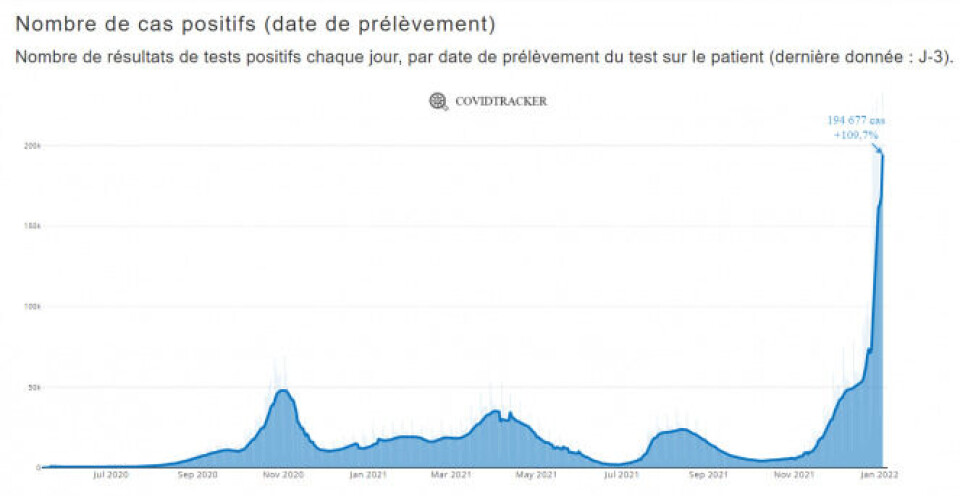-
Mysterious boom rattles residents in south-west France
Local community turns to social media for answers
-
France tightens reimbursement rules for flight delays or cancellations
New measures include mandatory mediation and new claim procedures
-
What snow conditions look like for skiers across French Alps and Pyrenees
Ski resorts are expected to get busier as school holidays begin this weekend
New French Omicron figures show variant makes up suspected 80% cases
Data had not been publicly available for ten days due to a change in tracing strategies. Figures here also show the regions most impacted

The Omicron Covid variant is thought to now make up 79.1% of cases nationally in France, data from Santé publique France (SPF) published on Thursday evening (January 6) shows.
This figure comes from the proportion of Covid tests screened specifically for the absence of the mutation L452R, which is present in Delta but not Omicron, plus the presence of several other mutations present in Omicron but not Delta.
It comes after a 10-day gap during which SPF was adjusting its Omicron tracing methods and precise data on the variant was not publicly available.
Grande nouvelle, Santé publique France a de nouveau publié les données sur les résultats de criblage. 👏🏻
— GRZ (@GuillaumeRozier) January 6, 2022
Omicron représente environ 79% des cas positifs au niveau national. pic.twitter.com/C4Jp6OZovo
France has averaged 194,677 new reported cases of Covid each day over the past week, including 332,252 reported cases over the 24 hours between Tuesday and Wednesday.
These figures are substantially higher than anything France has experienced since mass testing began during the Covid pandemic in mid-2020.
Read more:Coronavirus: Daily updates on the situation in France
The graph below shows the average weekly recorded Covid cases in France since July 2020.

The newly published data shows that the Omicron variant is most present in the northwest of France, with 84.2% of cases in Normandy linked to the variant, the highest percentage in mainland France. Provence-Alpes-Côte d’Azur has the lowest proportion, at 67.1%.
Percentage of Covid cases linked to Omicron variant (regions of mainland France):
- Auvergne - Rhône-Alpes: 75.2%
- Brittany: 83.3%
- Bourgogne-Franche-Comté: 72.6%
- Corse (Corsica): 69.6%
- Centre-Val de Loire: 79.9%
- Grand Est: 78.2%
- Hauts de France: 84%
- Ile-de-France (Paris): 83.(%
- Nouvelle-Aquitaine: 79:8%
- Normandy: 84.2%
- Occitanie: 76.6%
- Pays de la Loire: 83.7%
- Provence-Alpes-Côte d'Azur: 67.1%
📲 Dans #TousAntiCovid, vous pouvez désormais suivre l'évolution de la présence #Omicron en France. Avec la fonction comparer, visualisez d’autres données sur l’épidémie, en open data dès aujourd'hui.
— Cédric O (@cedric_o) January 6, 2022
Merci @SantePubliqueFr.
Téléchargez l’app ⤵️https://t.co/rPZBfZ8kJz pic.twitter.com/LzGg825e7r
SPF stated in a report published yesterday (January 6) in the past week there has been an “extremely marked acceleration in the circulation” of Covid, linked to the very rapid progression of the Omicron variant.
The health body also stated that there has been a more pronounced increase in new hospitalisations of people aged under 40, particularly among those aged under 9.
In the past week there has been an increase of 18% in the number of hospitalisations linked to Covid in France, making a total of 9,982.
However, there were 3% fewer patients transferred to intensive care units due to Covid in the past week compared to the week before, with the number falling to 1,822.
The number of people who died of Covid in the past week in hospitals or other care facilities was 1,275, 6% higher than the week before.
Why was there a gap in public Omicron data?
France is tracking Covid variants through two techniques, one called sequencing and one called screening (criblage).
Sequencing involves analysing positive Covid samples to find out the complete genetic makeup of the sample, allowing scientists to see all the mutations. This technique provides a more complete picture of variants in France, but is slower than screening and is done on a smaller scale.
Screening involves analysing positive samples for a select few mutations, which allows scientists to build a picture of what variants are in France. This can be done on a much bigger scale than sequencing.
Up until around the Christmas period, France was only targeting three mutations through this process: E484K, E484Q and L452R. As Omicron does not contain the L452R, scientists were able to suspect that any sample without was linked to Omicron.
However, it did not provide a completely accurate picture of Omicron, as other variants also do not contain that mutation. For this reason, SPF decided to begin looking for four specific mutations that Omicron does have. This change in technique took over one week to be carried out, leaving France without an accurate picture of Omicron cases in the country for 10 days.
Related articles
France and UK ease travel rules as Omicron spreads in both countries
False passes, Covid cases, hospitalisations: Latest figures for France
























